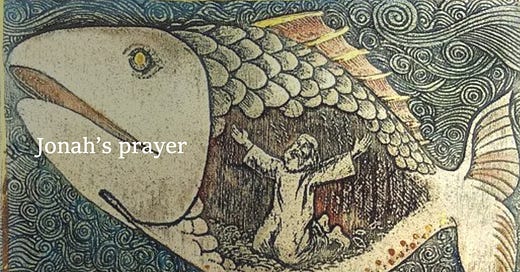Jonah 2:3, 4, 5, 8
Our responsorial psalm comes from the book of Jonah. Most of us are familiar with the story of this rebellious prophet. Told by God to go to the capital of the Assyrian Empire - Nineveh - that destroyed the Northern kingdom of Israel, he refused. He tried to run away but God pursued him and forced him into obedience. In between his first calling that the prophet rejected (Jonah 1:2) and the second calling that he accepted (Jonah 3:2), the book includes his prayer from the belly of the great fish (Jonah 2:3-10).
The prayer of Jonah resembles many psalms. It begins with a declaration that God answers our prayer: “Out of my distress I called to the LORD, and he answered me” (Jonah 2:3). Then the prophet described his tragic situation that resembles the chaos that preceded the creation of the world and the experience of the Jewish exiles forced to live in the foreign lands far away from the temple (Jonah 2:4-7). But the prophet holds on to the basic tenet of the Bible that God creates order from chaos, brings the exiles back home, and resurrects those who go down to the grave. “When my soul fainted within me, I remembered the LORD; My prayer reached you in your holy temple” (Jonah 2:8).
The deliverance of Jonah from the belly of the great fish (Jonah 2:11) has become a prophecy of resurrection. In the Gospel of Matthew, Jesus said: “For just as Jonah was three days and three nights in the belly of the great fish, so will the Son of Man be three days and three nights in the heart of the earth” (Matt 12:40). Jonah’s experience becomes a type of Christ’s experience - His death and resurrection. The presence of the risen Christ among us is the sign that should lead us to faith.
The prayer of Jonah also teaches about trusting God. The prophet prays from the belly of the great fish - a symbol of death - and his prayer reaches the Lord. “I sank to the base of the mountains; the bars of the earth closed upon me forever. Yet you brought up my life from the pit, O LORD my God” (Jonah 2:7, JPS). Jesus exemplified this trust when he talked about his incoming death and resurrection: “The Son of Man must suffer many things and be rejected by the elders and the chief priests and the scribes and be killed, and after three days rise again” (Mark 8:31). Jesus knew that his death would not be the end but a pathway to fulness of life.
The main message of the book of Jonah is about God’s mercy that extends to his rebellious prophet and the enemies of the Jewish people, the citizens of Nineveh. This is also the message of the Gospel: “For God so loved the world, that he gave his only Son, that whoever believes in him should not perish but have eternal life” (John 3:16). God loves us; Jesus died for us. We are called to spread this message about God’s love and mercy to all the corners of the world.




